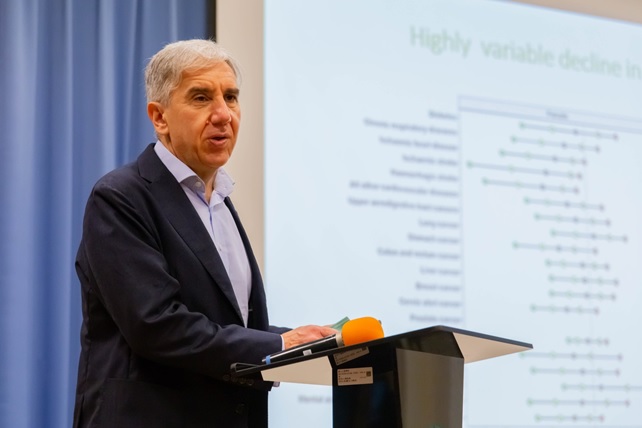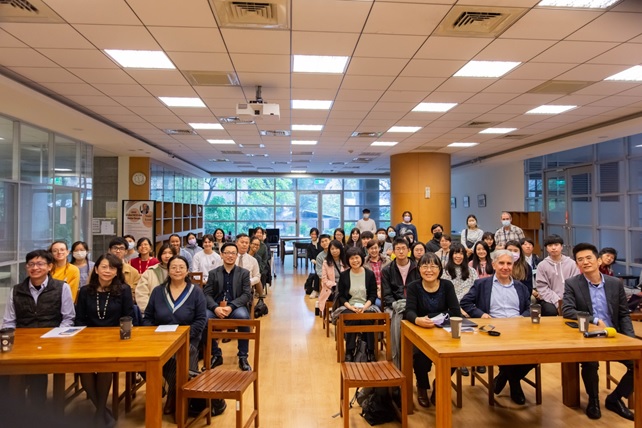
Prioritising Interventions for Non-Communicable Disease Risk Factors
Editors: Taiwan Burden of Disease Center Bing-Huan Tsai, Po-Chen Liu, April Hill; Proofreader: Fang-Wen Lu; Photographer: Wan-Tzu Hsia
Sustainable Development Goals (SDGs) Target 3.4 involves reducing premature mortality due to non-communicable diseases (NCDs) by one third (relative to 2015 levels) before 2030 and promoting mental health and well-being. NCD Countdown 2030 is an independent collaboration created to inform policies, track progress, and enhance accountability towards reducing the burden of NCDs. The first NCD Countdown 2030 report showed that recent progress in most countries is too slow to achieve the SDGs Target in time. Although Taiwan has significantly reduced premature mortality from non-communicable diseases in recent years, according to recent estimates, it is estimated that Taiwan would still reach the SDGs’ goal of reducing premature mortality by one-third sometime after the envisioned target year, 2030. Against this background, NCD Countdown identified several possible disease reduction pathways by which each country could reduce their burden of disease. However, there is no national-level data to demonstrate how much the reduction of preventable risk factors via population-based and personal interventions could contribute to disease-specific pathways for achieving SDG target 3.4.
The College of Public Health at National Taiwan University and Taiwan Burden of Disease Center held the “Prioritising non-communicable disease risk factor interventions” forum on December 9th, 2022. We invited the Director of NCD Factor Collaboration (NCD-RisC; www.ncdrisc.org), Professor Majid Ezzati from the Imperial College London, as a distinguished speaker. NCD-RisC is a consortium of nearly 1,500 health scientists around the world who work to provide accurate and timely data on risk factors for NCDs for 200 countries and territories. NCD-RisC aims to reflect the current status of non-communicable diseases in the country to assist governments and donors with assessing domestic resources and policy intervention priorities. According to the introduction from Professor Majid Ezzati, the consortium’s coordinating group works closely with all country collaborators. Adhering to strict data security measures, the consortium has several rounds of communication with collaborators prior to and during each stage of analysis. During these meetings, the source and its characteristics (i.e. completeness, validity, and interpretation of results) are thoroughly examined. NCD-RisC has published its findings in high-impact journals as well as national policy reports, providing insight into topics such as trends in specific risk factors and their magnitude of impact, with the most recent topic covering the treatment and control of hypertension. Each publication is jointly authored by the entire consortium and includes a writing group that integrates experts and important scholars in relevant countries and disciplines. Specifically, Professor Ezzati described Taiwan as a data-rich country, contributing 18 different studies from the Taiwanese population.
There are challenges in using heterogeneous data for estimation, including sparse data in some countries, missing data in some age groups, large variability in data within the same country, and poor representation of certain regions or communities. These problems permeate data at both the local and national level. In order to manage these limitations, the NCD-RisC takes advantage of “borrowed strength,” which involves applying a series of custom-designed Bayesian meta-regression models to adjust for non-linear time trends and age associations. Applying these models not only systematically estimates the random differences between national and subnational data, but it also allows for an estimation of results for subgroups, including rural and urban populations. Furthermore, the rigorous uncertainty interval estimates account for uncertainty due to missing data and data variability. The current NCD-RisC results allow for benchmarking the past trends for specific risk factors across countries. For example, Professor Ezzati illustrated that Canada, Germany, Taiwan and South Korea have had exceptional performance in scaling up hypertension treatment and control when compared to other industrialized nations. However, there are still gaps in the continuity of care from diagnosis to control in many areas. Additionally, the current results do not provide information on the co-occurrence of multiple risks in the population or population subgroups, nor does it estimate their possible future trends. This information is essential for population-based prevention programs and clinical interventions to coherently and effectively prevent and manage conditions based on their co-occurrence in the population.
Professor Ezzati then introduced the ultimate purpose of the NCD-RisC analyses: identify which conditions and interventions should be prioritized based on the population’s needs and provide a baseline for modeling the future impacts of potential interventions. To do this, a condition must, first and foremost, demonstrate the need for public health and clinical interventions. The NCD-RisC analyses reveal the distribution patterns of multiple conditions that are associated with similar disease outcomes and share upstream nutritional and dietary determinants within the population and various population subgroups (i.e. age, sex, place of residence, and socioeconomic status). The second phase measures the existing coverage of select interventions. In addition to individual risk intervention policies, there are also comprehensive intervention policies that target a combination of risk factors, such as cardiovascular disease prevention interventions based on absolute-risk-based allocation of lipid-lowering drugs, like statins. The third step presents observed trends and uses them to project future risk factor trends using a “business as usual” model, which shows whether countries are on track to meet global risk factor targets (e.g. the WHO’s NCD Global Monitoring Framework) and provides a basis for modeling the impact of select interventions on risk factor trajectories. These can eventually be used in subsequent epidemiological models to estimate an intervention’s impact on mortality or assess progress towards global and national targets. All of the analyses are done according to a rigorous methodology, thus allowing for comparisons in risk factor trends and intervention coverage across countries.
In the second half of the forum, we invited panelists Dr. Hsing-Yi Chang from the National Health Research Institute, Professor Chyi-Huey Bai from Taipei Medical University, and Director Chien-Yuan Wu and research fellow Long-Sheng Chen from the Health Promotion Administration to participate in an interactive discussion. These distinguished guests introduced several health data sources available in Taiwan, e.g., health interview survey, health check-ups, the cancer registry, and health insurance data. From there, they discussed which NCD intervention contributes the most toward treatment of and prevention of specific diseases that are leading causes of mortality in Taiwan. By analyzing past data, we can have insight into future health trends. We believe that, by inviting Professor Majid Ezzati to discuss how NCD-RisC uses data to highlight global issues of chronic diseases and their risk factors and provide a scientific basis to inform policymaking by governments and nongovernmental organization, all our attendees gained a better understanding of current health trends and their importance in promoting the health of present and future generations.
Lastly, the forum was a success thanks to contributions by multiple people and institutions, including the wonderful presentation led by Professor Majid Ezzati, the support of the National Taiwan University College of Public Health, and the participation of all the discussants and attendees. The Taiwan Burden of Disease Center is looking forward to hosting similar forums and opportunities in the future.


